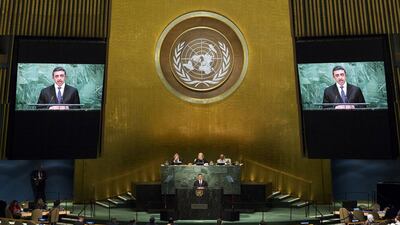Standing before the United Nations last week, the Foreign Minister Sheikh Abdullah bin Zayed sought to highlight the links between the various threats the Middle East now faces.
“Since the Second World War, the world has not witnessed such an escalation in brutal and shocking terrorist crimes carried out by extremist organisations – most notably Daesh [ISIL], Al Qaeda, Hizbollah, Ansar Allah [the Houthi rebels], who exploit religion for political purposes,” he said.
By drawing together the conflicts spread across Syria, Iraq, Yemen and Libya, the Foreign Minister was explaining that these conflicts are linked; they cannot be solved piece by piece. He also stressed that these conflicts will not remain in one place: “The threat ... transcends geographical boundaries and is a risk not only for our region but for all states and communities”.
In his speech, he also singled out Egypt’s Al Azhar, the premier seat of Sunni Islamic learning, and the Sawab Centre, the joint US-UAE institution aimed at countering the social media messaging of ISIL, for tackling the ideas behind such terrorism.
Sheikh Abdullah explained that the UAE was playing its part in all of these conflicts, in different spheres – sometimes politically, as in Egypt, by supporting the political and economic achievements of the government there, and sometimes militarily, in Yemen. Speaking about that conflict, the Foreign Minister reaffirmed the UAE’s commitment to the Saudi-led coalition and said the UAE would continue to work with the UN to ease the humanitarian situation.
Sheikh Abdullah also had words on older conflicts, singling out two long-running occupations in the region; the occupation of Palestine (which “remains at the core of conflict in our region”), and the Iranian occupation of three UAE islands. The foreign minister reiterated the UAE’s call for the issue to be resolved through “serious direct negotiations”, or by referring it to the International Court of Justice. It is essential that the world body hear those messages clearly.

